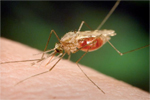Climate change may increase the incidence of diarrheal disease in Botswana, according to a recent study in the International Journal of Environmental Research and Public Health.
“Diarrheal disease is a very important public health problem in Botswana,” said lead author Kathleen Alexander, who led a unique 30-year analysis (1974-2003) on the incidence of diarrhea in Botswana. “As a water-restricted country, Botswana is predicted to be heavily impacted by climate change. I wanted to understand how climate change might influence this already critical problem and what mitigation action was necessary to avert potential impact on human health.”
Nearly 760,000 children, under the age of 5, die annually from diarrheal disease, making it the 2nd leading cause of death for that age group. Children that live in communities lacking improved drinking water and sanitation are especially vulnerable. According to the World Health Organization (WHO), 780 million people do not have access to improved drinking water and 2.5 billion do not have access to improved sanitation.
 House of the Parliament of Botswana in Gaborone. Photo by Iulus Ascanius. |
Alexander and her colleagues looked at visits to health clinics and various climate and meteorological measures to identify any possible associations. They found that diarrheal instances in the dry-season (April-September) were an average of 20% higher than instances in the wet season. This result was a surprise. Researchers suspected diarrhea incidences would be higher in the wet season. The particulars of ‘why’ diarrhea is worse during the dry-season, remains unanswered. Currently, the hypothesis is the increased fly population during the dry-season contributes to disease transmission.
With only three permanent sources of surface water, aquifers, and rainfall to supply the entire population of Botswana, water scarcity and water quality are ongoing problems in the southern African nation. Botswana declared 2013-14 a drought year due to the low amount of rainfall. Lower crop yields, potentially leading to food shortages, may increase the likelihood of higher than usual drought-related deaths. Young children under the age of five are especially vulnerable to the environmental stress of a poor harvest. The degree to which Botswana’s experienced increased droughts in the last 36 months has fluctuated. Even when water is available, it’s quality frequently contributes to health problems (e.g., diarrhea, trachoma, and intestinal worms).
Alexander’s study asserts that only through “enhanced regional water planning (access and quality) and water conservation practices ” will Botswana take initial steps toward improving current health problems and mitigating the impacts of climate change.
Scientists call a community, city, or region’s response to climate change-driven extreme weather its adaptive capacity. Interestingly, adaptive capacity has not been found to be linked to economic prosperity. Within both, developed and developing countries, response systems with high and low adaptive capacities exist.
Alexander’s study argues that it is crucial for Botswana to design a vulnerability-led response system as opposed to an impacts-led system (i.e., pro-active vs. reactive).
“The impact of forecasted climate change on this disease syndrome is likely to be significantly reduced if present day public health deficiencies are fully identified and effectively addressed. Understanding how climate interacts with disease transmission and persistence dynamics will be critical to intervention design and underscores the importance of climate-health research in addressing present-day public health needs and preparing for future climate change impacts.”
CITATION: Alexander, K.A., Carzolio, M., Goodin, D., Vance, E. (2013). Climate change is likely to worsen the public health threat of diarrheal disease in botswana. International Journal of Environmental Research and Public Health, 10, 1202-1230.
Related articles

(09/28/2013) Human actions are responsible for warming the Earth, reconfirms the landmark Intergovernmental Panel on Climate
Change (IPCC) report released today, the first mammoth report on the physical science of climate change issued in seven years. Scientists now say they are 95-100 percent certain that human actions—such as burning fossil fuels and cutting down forests—are behind the observed rise in global temperatures since at least 1950. Average temperatures have risen 0.85 degrees Celsius since 1880, but the new report warns that depending on how much more fossil fuels are burnt, temperature rises could exceed 4 degrees Celsius (9 degrees Fahrenheit) with untold consequences for global society.
Climate change to hurt children most
(09/25/2013) Children will bear the brunt of the impact of climate change because of their increased risk of health problems, malnutrition and migration, according to a new study published on Monday. And food prices are likely to soar as a result of warming, undoing the progress made in combating world hunger.
Cell phones help decipher malaria transmission in Kenya

(11/19/2012) Malaria parasites can stow away silently in a person’s bloodstream. Without any symptoms to betray them, their human host can unwittingly transport the parasites hundreds or thousands of miles. Tracking them has been nearly impossible, especially in poor countries. Now, researchers have harnessed a new tool: the burgeoning number of cell phone users in Africa, which help trace how malaria spreads.













